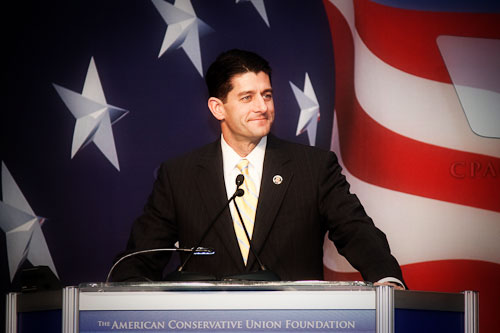Cheerleading Ryan

What's more fun to try and figure out: why Paul Ryan is not running for president or why the Weekly Standard and Bill Kristol are very sad that Ryan is not running for President?
For the past week, the Weekly Standard has had Stephen Hayes wearing his reporting hat and his reporting-advocacy hat. On the one hand, Hayes does seem have connections with sources near Ryan who can comment on whether or not Ryan was seriously considering a presidential bid, and by all accounts, he was for a least a few weeks of the summer.
Yet Hayes also has been busy collecting quotes from other politicians to try and convince Ryan to run - playing the role of a cheerleading advocate.
Maybe the right question is not "Why does the Establishment want Paul Ryan" but instead "Is the Establishment Scared of Rick Perry?"
Hayes reports that Karl Rove spoke to Paul Ryan about a presidential run and Rove has not been shy about saying that Rick Perry's recent Federal Reserve comments have not been Presidential.
It's also worth reading Andrew Ferguson's piece on Perry in the Weekly Standard. It is not a work of hagiography:
Perry’s idea of federalism, boiled down, becomes a kind of crude majoritarianism. What if you favor both medicinal marijuana and the death penalty? What if you’re a guy who takes comfort living in a state where citizens pack hand guns but you still want to marry your boyfriend? You’re out of luck.
…
Perry isn’t anti-government; he is anti-federal government. (Whether he’ll remain anti-federal government when he’s running it can’t be known.) He is after all a man who has spent his entire professional life working for the government as a state legislator and executive. You might even call him a big-government conservative whose reach is constrained only by the Texas border. A better tag would be “Conservative Democrat circa 1960”: a politician always happy to accommodate the interests of businessmen and never shy about deploying the resources of his government in causes he likes.
And that's before we get to the discussion about the "Texas Miracle":
Beyond the robust job creation — a product of low taxes and regulation and the entrepreneurial opportunities they provide — Texas looks much less appealing on paper. For the next several months, any Democrat will be happy to give you the statistics: It leads the country in percentage of population without health insurance (24 percent) and the number of residents over 25 without a high school degree. Texas generates more hazardous waste than any other state and ranks first in the amount of toxic chemicals released into the water. It ranks eighth nationally in percentage of homes below the poverty line (17 percent), thirty-fourth in median household income, ninth in income inequality, and sixteenth in the rate of violent crime.
This reporting suggests a strong awareness that Perry has a lot of negatives and that while he could beat Obama, but he may not necessarily be the best candidate.
So maybe the hunt for "Anybody Electable But Romney" is still going on?

